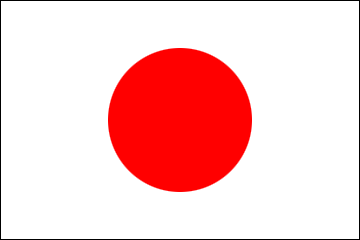Japan Signs Four (4) New Grant Contracts under the Grant Assistance for Grassroots Human Security Projects (GGP) Scheme
2022/3/4
On March 3, 2022, Ambassador KOSHIKAWA Kazuhiko signed four grant contracts under the Grant Assistance for Grass-roots Human Security Projects (GGP) *1 at his official residence. The total grant amount of USD 393,881 (approximately PHP 20 million), will be used for the procurement of two ambulances, medical equipment, and refrigerated delivery trucks for agricultural produce as well as the reconstruction of a health center.
In his message during the ceremony, Ambassador KOSHIKAWA expressed his delight to host this ceremony as it is the GGP grant contract signing ceremony since the start of the COVID-19 pandemic. He acknowledged the four projects address issues that are integral to ensuring social and economic development for all and commended the strong commitment of proponents to the development of their communities even in the most challenging of times.
The details of the four projects are as follows:
1.The Project for Provision of Two Ambulances in Parañaque, Metro Manila
・Proponent: City Government of Parañaque
・Grant Amount: USD 54,976 (PHP 2,777,296)
・Overview: The project is set to provide two brand-new ambulances to Parañaque City. Despite approximately 6,000 dispatch requests a year, the city has only six vehicles, forcing the city to turn down 10 to 20% of dispatch requests due to lack of available emergency vehicles. Through the provision of two ambulances, the project is expected to strengthen the emergency response system and improve emergency medical care services for its 715,000 residents.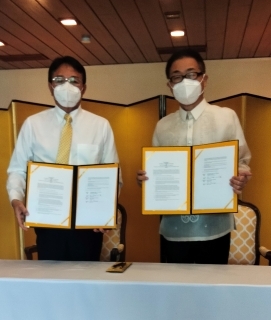
2.The Project for Construction of the Grace Park Health Center in Caloocan City, Metro Manila
・Proponent: City Government of Caloocan
・Amount: USD 120,477 (Php 6,064,091)
・Overview: The project is set to reconstruct the Grace Park Health Center in Caloocan City. Since the center was originally built 65 years ago, it is in a dilapidated state. When a heavy rain occurs, the center often has water leakages and flooding, making it unsuitable to be used as a health facility from the health and safety standpoints. Through the reconstruction of the main facility, the project is expected to improve the quality of healthcare for approximately 9,600 Caloocan residents2/.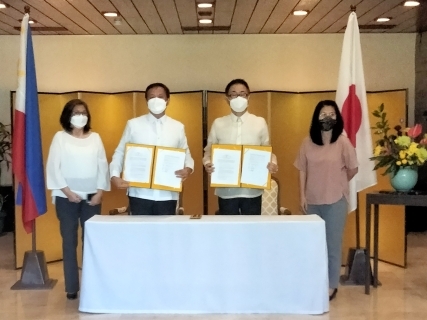
3.The Project for Provision of Medical Equipment for the Rural Health Unit of Palo, Leyte
・Proponent: Municipal Government of Palo
・Amount: USD 128,197 (PHP 6,494,760)
・Overview: The project is set to provide X-ray machine, ECG machine, ultrasound system, and other medical equipment that are required for a secondary level clinical laboratory facility as per stipulated by the Department of Health. Through strengthening the diagnostic capacity of the Palo Rural Health Unit, the project is expected to provide a wider variety of diagnostic services to 8,000 Palo and neighboring town residents2/, which will result in early detection of illnesses such as infectious diseases and cancers and reduce severe cases of such illnesses.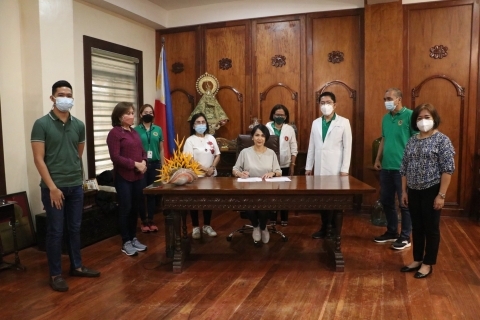 *The Mayor of Palo attended the Joint Grant Contract Ceremony on-line.
*The Mayor of Palo attended the Joint Grant Contract Ceremony on-line.
4. The Project for the Provision of Delivery Trucks for Small Farmers in Laguna, Rizal and Antique
・Proponent: Ahon sa Hirap, Inc (ASHI),
・Amount: USD 90,231 (php 4,591,964)
・Overview: The project is set to provide three refrigerated delivery trucks for small farmers clusters in Laguna, Rizal, and Antique provinces. By reducing the food loss and deterioration of produce quality, the project is expected to improve farmers’ marketing and access to agricultural value chain and contribute to the improvements in the livelihoods of 5,000 farmers of target areas.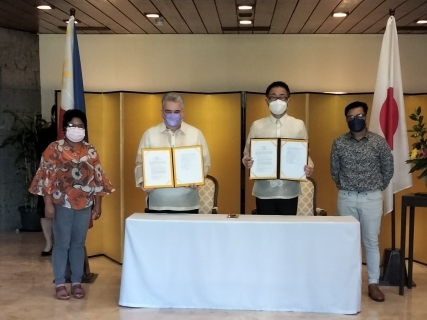
*1 As the top ODA donor to the Philippines, the Government of Japan launched the Grant Assistance for Grass-roots Human Security Projects in the Philippines in 1989 to reduce poverty and help various communities engage in grassroots activities. At present, 553 grassroots projects (including the above mentioned four projects) have been implemented by the GGP. Japan believes that these projects will strengthen the friendship between Japan and the Philippines and contribute to sustaining strategic partnerships between the two countries.
2/ Aggregated number of annual facility users
In his message during the ceremony, Ambassador KOSHIKAWA expressed his delight to host this ceremony as it is the GGP grant contract signing ceremony since the start of the COVID-19 pandemic. He acknowledged the four projects address issues that are integral to ensuring social and economic development for all and commended the strong commitment of proponents to the development of their communities even in the most challenging of times.
The details of the four projects are as follows:
1.The Project for Provision of Two Ambulances in Parañaque, Metro Manila
・Proponent: City Government of Parañaque
・Grant Amount: USD 54,976 (PHP 2,777,296)
・Overview: The project is set to provide two brand-new ambulances to Parañaque City. Despite approximately 6,000 dispatch requests a year, the city has only six vehicles, forcing the city to turn down 10 to 20% of dispatch requests due to lack of available emergency vehicles. Through the provision of two ambulances, the project is expected to strengthen the emergency response system and improve emergency medical care services for its 715,000 residents.

2.The Project for Construction of the Grace Park Health Center in Caloocan City, Metro Manila
・Proponent: City Government of Caloocan
・Amount: USD 120,477 (Php 6,064,091)
・Overview: The project is set to reconstruct the Grace Park Health Center in Caloocan City. Since the center was originally built 65 years ago, it is in a dilapidated state. When a heavy rain occurs, the center often has water leakages and flooding, making it unsuitable to be used as a health facility from the health and safety standpoints. Through the reconstruction of the main facility, the project is expected to improve the quality of healthcare for approximately 9,600 Caloocan residents2/.

3.The Project for Provision of Medical Equipment for the Rural Health Unit of Palo, Leyte
・Proponent: Municipal Government of Palo
・Amount: USD 128,197 (PHP 6,494,760)
・Overview: The project is set to provide X-ray machine, ECG machine, ultrasound system, and other medical equipment that are required for a secondary level clinical laboratory facility as per stipulated by the Department of Health. Through strengthening the diagnostic capacity of the Palo Rural Health Unit, the project is expected to provide a wider variety of diagnostic services to 8,000 Palo and neighboring town residents2/, which will result in early detection of illnesses such as infectious diseases and cancers and reduce severe cases of such illnesses.

4. The Project for the Provision of Delivery Trucks for Small Farmers in Laguna, Rizal and Antique
・Proponent: Ahon sa Hirap, Inc (ASHI),
・Amount: USD 90,231 (php 4,591,964)
・Overview: The project is set to provide three refrigerated delivery trucks for small farmers clusters in Laguna, Rizal, and Antique provinces. By reducing the food loss and deterioration of produce quality, the project is expected to improve farmers’ marketing and access to agricultural value chain and contribute to the improvements in the livelihoods of 5,000 farmers of target areas.

*1 As the top ODA donor to the Philippines, the Government of Japan launched the Grant Assistance for Grass-roots Human Security Projects in the Philippines in 1989 to reduce poverty and help various communities engage in grassroots activities. At present, 553 grassroots projects (including the above mentioned four projects) have been implemented by the GGP. Japan believes that these projects will strengthen the friendship between Japan and the Philippines and contribute to sustaining strategic partnerships between the two countries.
2/ Aggregated number of annual facility users
